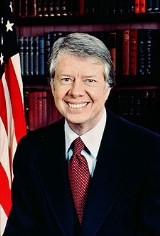
(1977–1981) and was the recipient of the 2002 Nobel Peace Prize
, the only U.S. President to have received the Prize after leaving office. Before he became President, Carter served two terms as a Georgia State Senator
and one as Governor of Georgia (1971–1975), and was a peanut farmer and naval officer.
As President, Carter created two new cabinet-level departments: the Department of Energy
and the Department of Education
.
1977 Jimmy Carter is inaugurated as the 39th President of the United States. He is the last President inaugurated at the east front of the Capitol, which had been the traditional site for Presidential inaugurations since 1829.
1977 President Jimmy Carter pardons nearly all American Vietnam War draft evaders, some of whom had emigrated to Canada.
1977 US President Jimmy Carter signs legislation creating the United States Department of Energy.
1978 Development of the neutron bomb is canceled by President Jimmy Carter.
1978 U.S. President Jimmy Carter declares a federal emergency at Love Canal.
1978 U.S. President Jimmy Carter, President Anwar Sadat of Egypt, and Prime Minister Menachem Begin of Israel meet at Camp David and agree on the Camp David Accords a framework for peace between Israel and Egypt and a comprehensive peace in the Middle East.
1978 U.S. President Jimmy Carter announces that the United States will recognize the People's Republic of China and cut off all relations with Taiwan
1979 Convicted bank robber Patty Hearst is released from prison after her sentence is commuted by President Jimmy Carter.
1979 Anwar al-Sadat, Menachem Begin and Jimmy Carter sign the Israel-Egypt Peace Treaty in Washington, D.C..
1979 U.S. President Jimmy Carter signs the first directive for secret aid to the opponents of the pro-Soviet regime in Kabul.
Aggression unopposed becomes a contagious disease. ![]()
I've looked on many women with lust. I've committed adultery in my heart many times. God knows I will do this and forgives me.![]()
Penalties against drug use should not be more damaging to an individual than the use of the drug itself. Nowhere is this more clear than in the laws against the possession of marijuana in private for personal use.![]()
Human rights is the soul of our foreign policy, because human rights is the very soul of our sense of nationhood. ![]()
For the first time in the history of our country the majority of our people believe that the next five years will be worse than the past five years. ![]()
We live in a time of transition, an uneasy era which is likely to endure for the rest of this century. During the period we may be tempted to abandon some of the time-honored principles and commitments which have been proven during the difficult times of past generations. We must never yield to this temptation. Our American values are not luxuries, but necessities— not the salt in our bread, but the bread itself.![]()

